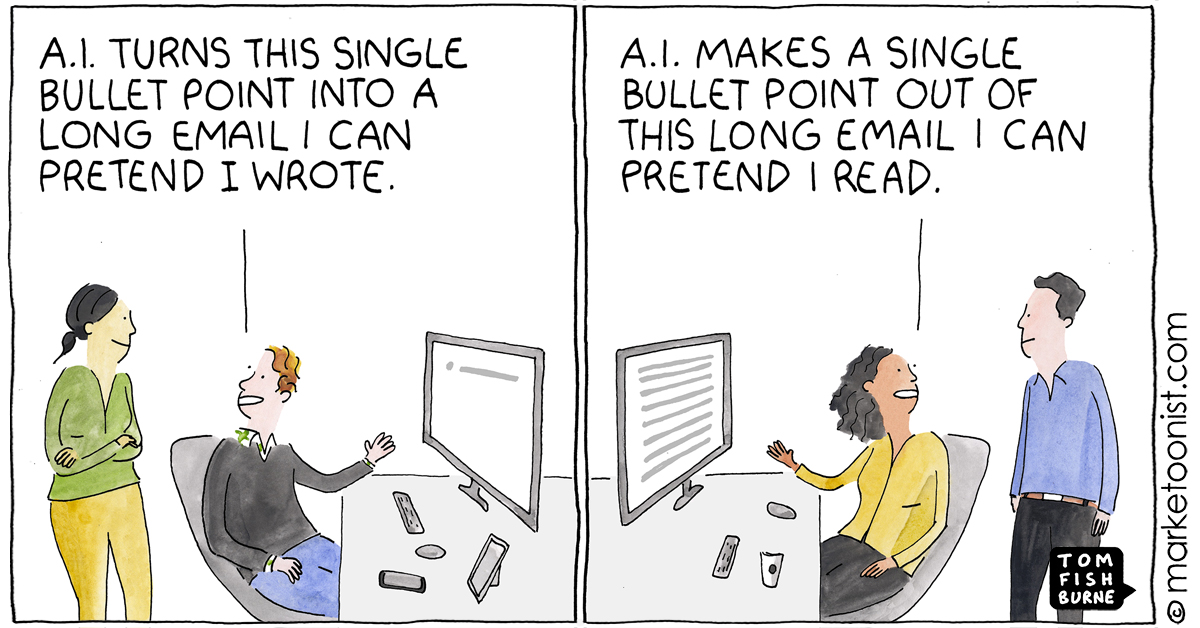Challenge expectations
This comic from “marketoonist.com” showed up on LinkedIn somewhere and made me laugh. It depicts one person boasting about using AI to expand a single bullet point into a lengthy email, and another person boasting about using AI to condense a long email into a single bullet point.
I think the reason this is funny is because it’s just possible enough to be believable, and highlights an ironic office process dysfunction in a novel way. It’s a ChatGPT joke, but it’s also a foolish workplace norms joke.
Let’s dig into what we can learn from it.

Sometimes a new perspective reveals the foolishness in an activity that we carry out with great seriousness and zeal. Writing detailed, fact-filled emails might be rewarded on its face, and finding ways to employ new tools, like AI, to save time in creating and interpreting them could certainly feel like a massive productivity upgrade to each of the two people in the aforementioned comic.
But from your perspective as the reader, seeing both of them at the same time, aware of how one cheats to create the message and the other cheats to interpret it, it would seem that long and detailed emails are a criminal waste of time and effort.
Awareness is the true productivity “hack”
I thought about this comic for a long time. I wanted to figure out why it’s so funny, whether AI actually has anything to do with it, and what lesson I could take away to share with all of you.
At first, I thought this was a comic about eliminating “toil” in your work. Many of our workplaces suffer from pointless process and “busywork” that we carry out because it’s expected while maybe unnecessary. I started off by examining how the promise of automation (AI in the case of this comic) might reveal this “unnecessary busywork.”
That line of thinking fell apart when I realized that what is going on in this comic isn’t actually automation. At least, not in the toil-reducing way that we typically think about automation. Rather than reducing some necessary but banal and uncreative work to a button-press, in this comic the computer is helping one person produce something that the other person’s computer completely destroys.
From a pure process perspective, it’s a no-op. It’s actually worse than a no-op, because there’s approximately a zero percent chance that the full intended meaning of the original bullet made it through the AI expansion and subsequent AI summarization intact. That content had no reason to exist, and in this example its existence made matters worse.
Then I realized that a lot of the humor stems from just how proud these two people appear to be, boasting to colleagues about their novel use of AI to eliminate drudgery that they both find pointless but for some reason necessary. It’s funny because they’re proud of cheating their way out of something they could have avoided entirely if they actually talked to each other about it.
That awareness, the awareness that you have as the reader, and the awareness that the characters in the comic lack because they follow office norms quietly and uncritically, is the pivot point of the whole gag. These people work in a cargo cult where it’s believed that email length and detail causes promotions to rain from the heavens or something, and the only thing holding them back from eliminating this deplorable misuse of company time is opening their mouths about it.
It’s not just talking
Awareness hinges on two things, and this is going to seem obvious—because it is—but here goes:
-
That someone who knows something shares it, and
-
That someone else hears it, and listens.
How much pointless drudgery could be eliminated from your job if anyone who thought they saw some actually talked about it, and if other people actually listened? That’s a rhetorical question because 100% of true pointless drudgery would be immediately eliminated if it was that simple.
In the real world, a lot of pointless drudgery evades elimination because it serves some other purpose. Perhaps it is a “pet process” for someone with positional authority, or the cost of eliminating it is perceived to be higher than just making everyone continue to do it forever.
Nevertheless, consider this opposite framing: 0% of true pointless drudgery will ever be eliminated by not making people aware of it.
A naive simplification of that idea is to “be the squeaky wheel,” and that’s not always bad advice, and it will probably work for you sometimes, but I don’t think that’s the real take-away from the scenario in this comic strip.
Employ your curiosity
Once again, the central pivot of the comic’s punchline is that these two people are independently nullifying each other’s efforts. It wouldn’t be as funny if either of them actually liked writing or reading long and detailed emails.
The solution to this problem is not complaining but rather exploring. Even if complaining might lead to the same outcome, nobody likes a complainer, and for that reason a more genuine investigation is more likely to succeed.
If either of the people in this strip approached the other with honest curiosity to ask what they thought the real value in such a long and detailed email might be, the chances are good that the two of them would have a very interesting conversation. Perhaps that would lead to change (and I’d wager that it would), but it would also lead to both people understanding each other better and permanently deepening their relationship.
What relationship, at work or at home, would suffer from some deepening?
Questions for you
-
What’s one activity you feel compelled to do at work, but also suspect could be eliminated?
-
Who is one person in your life (at work or at home) whom you could learn more about this week?
-
What else about your world might improve with more awareness?
Was this useful? Want more? You know what to do!
subscribeWhat would you create, if you knew you couldn't fail? I help engineering leaders achieve their impossible dreams. Learn more here.

